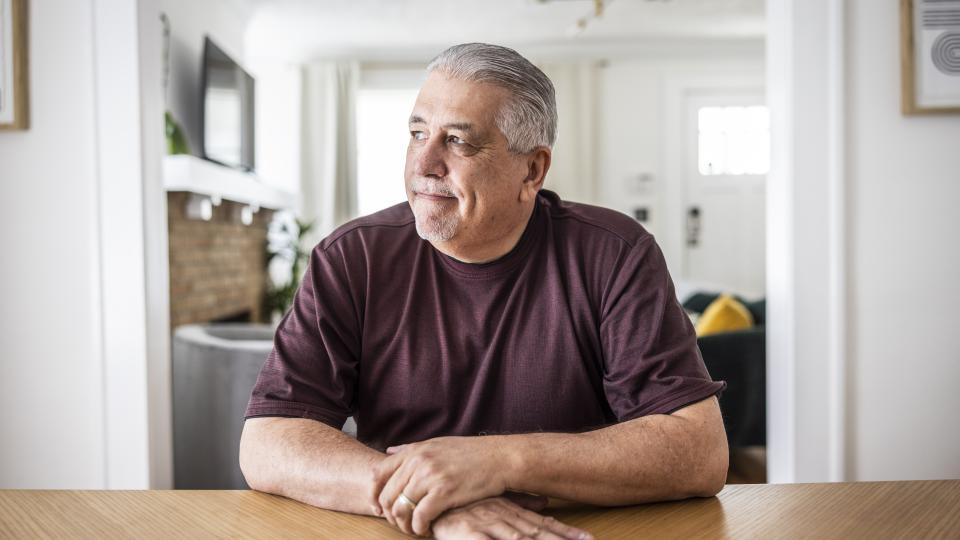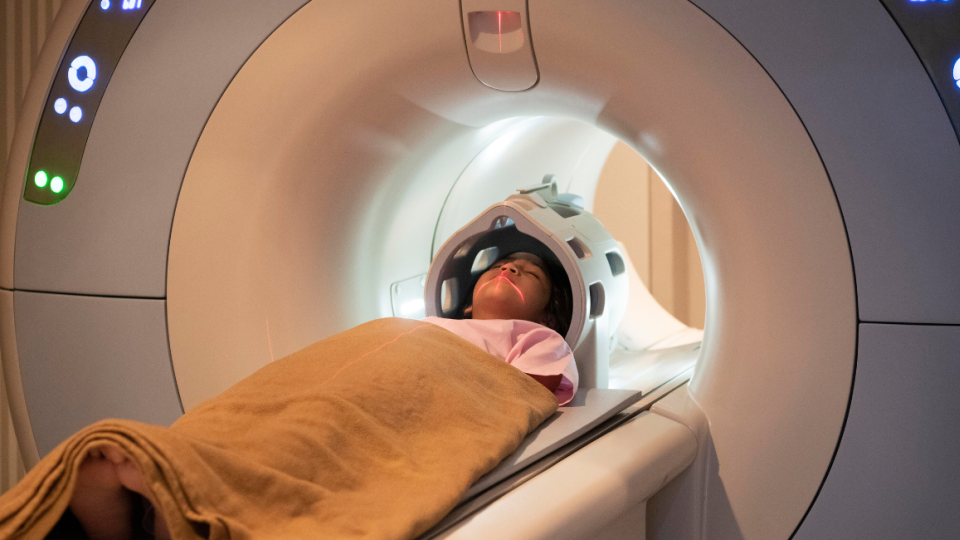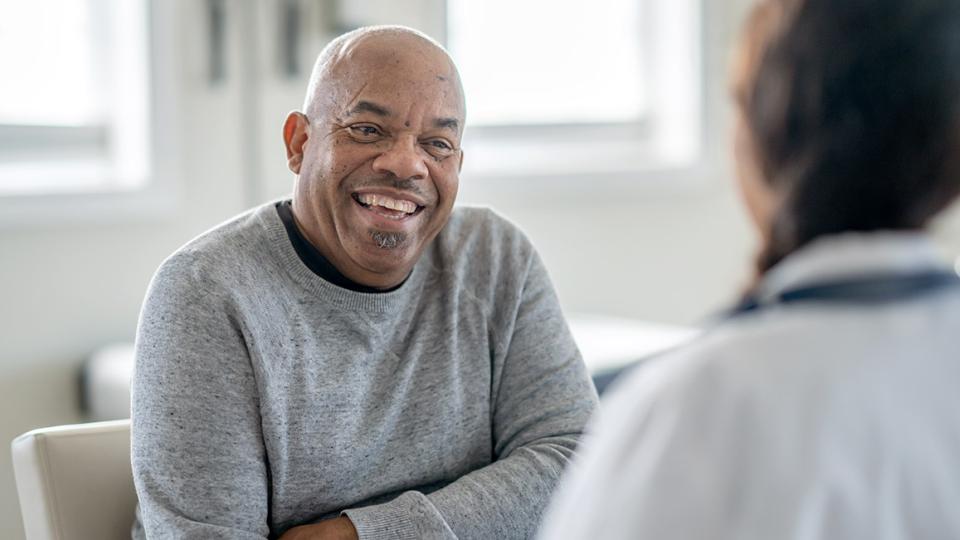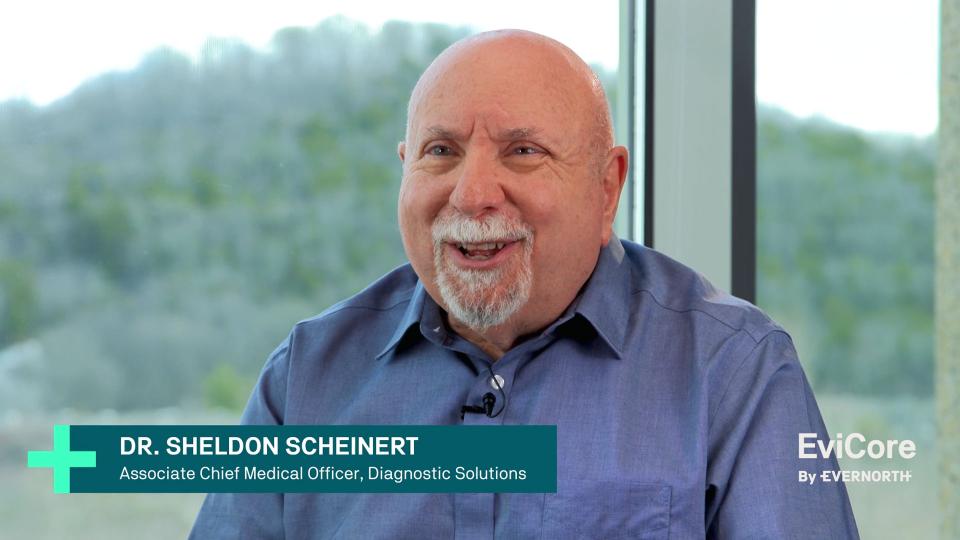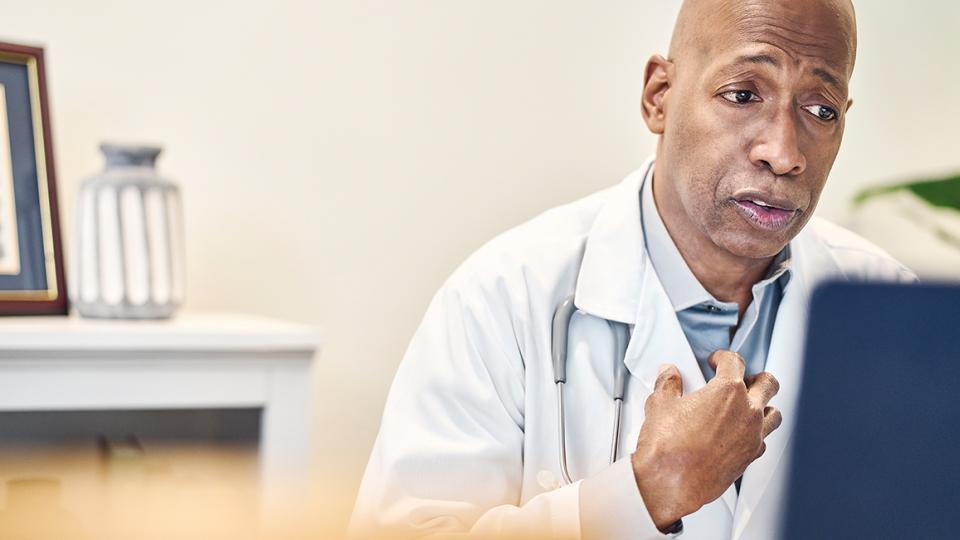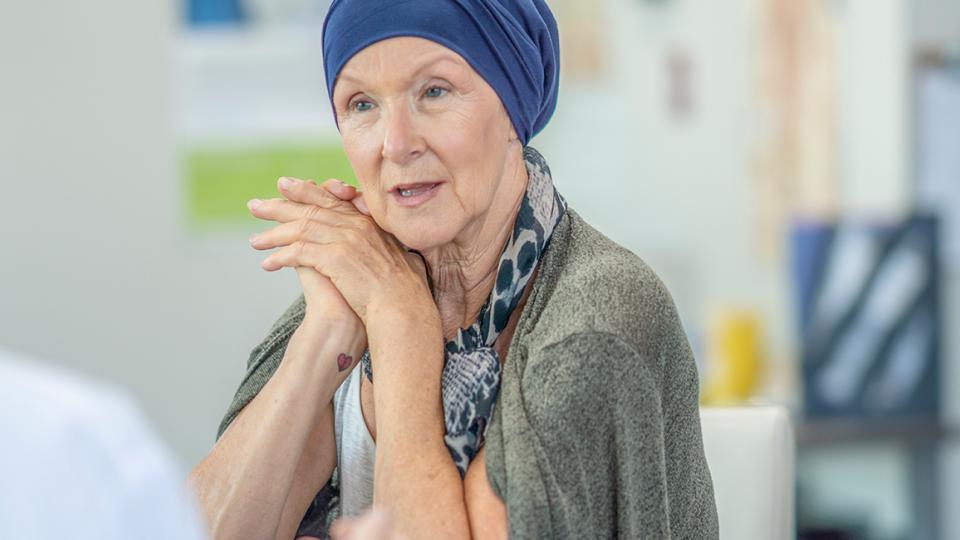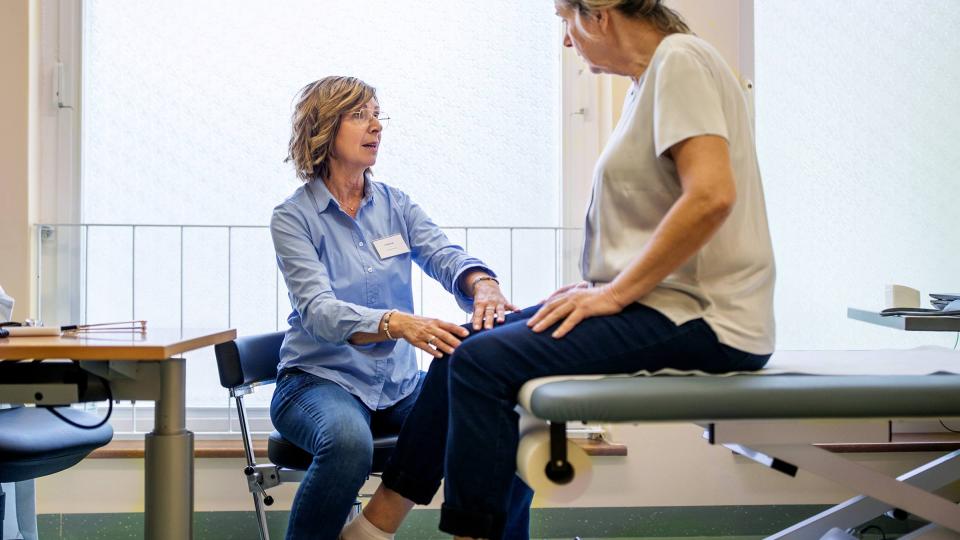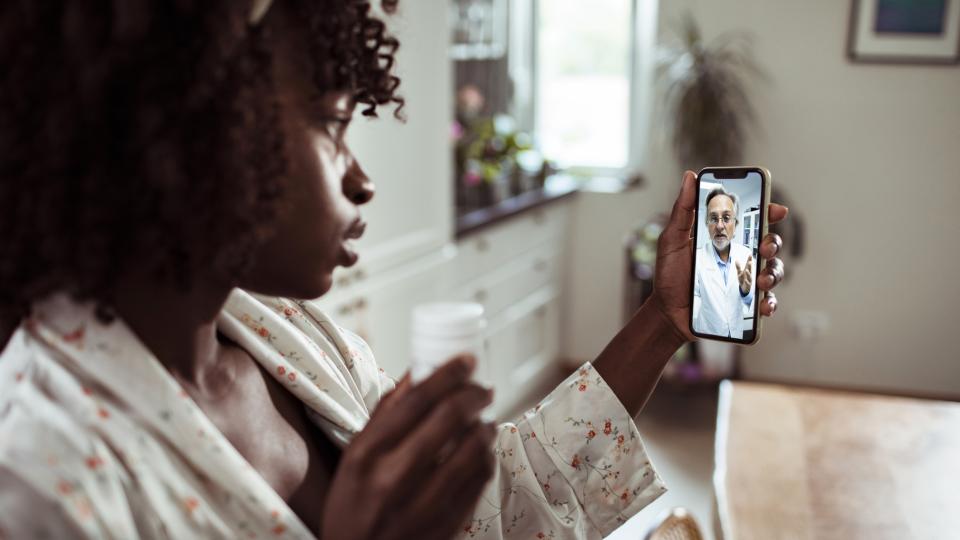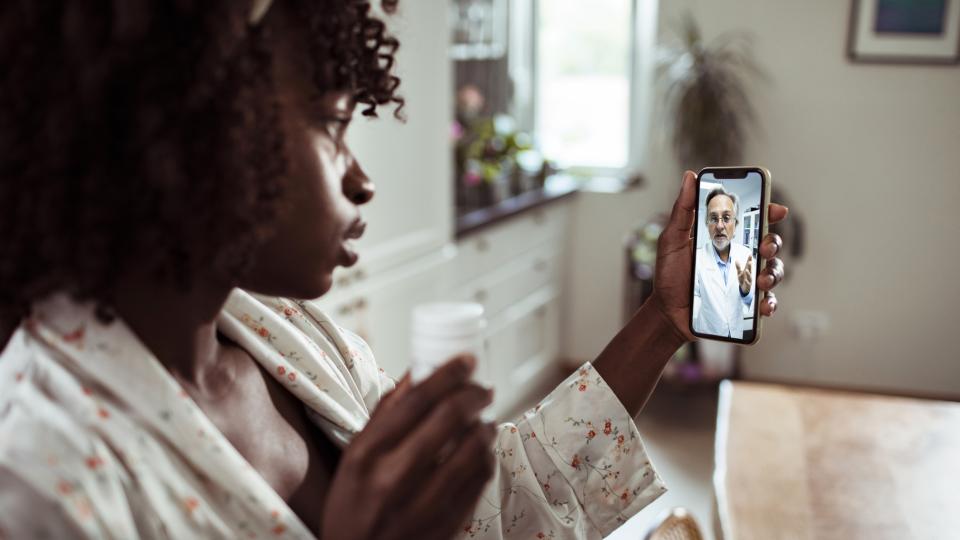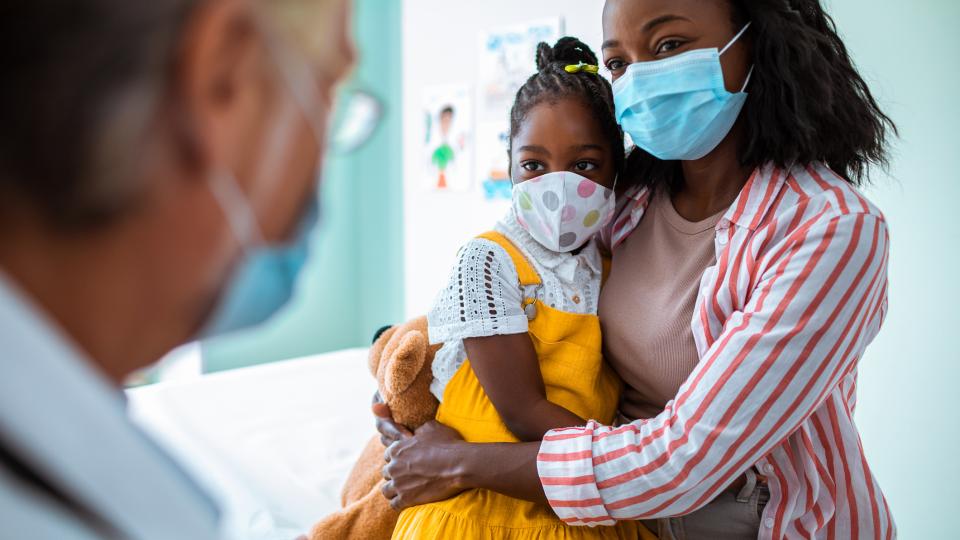Impact of direct member outreach
See how EviCore by Evernorth Preventive Care Outreach solution helps patients like Kathy* avoid harmful health outcomes. Click through her story below to see how different her life is if she follows preventive measures.
Improving Member Access and Affordability Through Smarter Sites of Care
EviCore by Evernorth is helping make health care more affordable and accessible by guiding members to high-quality, in-network, and cost-effective care locations. Through personalized support programs like SmartChoice and Site of Care, members receive help navigating options, scheduling appointments, and reducing out-of-pocket costs—leading to better experiences, improved outcomes, and over $130 million in annual savings.
WATCH: Helping Providers Connect to the Latest Evidence-Based Oncology Care
Connecting providers with the latest scientific evidence can help them deliver high-quality patient care with minimal administrative burden.
Getting to “Yes” faster with prior authorization
EviCore by Evernorth® is working to continuously improve the utilization management solutions we offer today and transform the solutions we’ll offer tomorrow. Reducing the administrative burden for providers is a major focus of our efforts with intelliPath.
All Insights
See how EviCore by Evernorth Preventive Care Outreach solution helps patients like Kathy* avoid harmful health outcomes. Click through her story below to see how different her life is if she follows preventive measures.
EviCore by Evernorth is helping make health care more affordable and accessible by guiding members to high-quality, in-network, and cost-effective care locations. Through personalized support programs like SmartChoice and Site of Care, members receive help navigating options, scheduling appointments, and reducing out-of-pocket costs—leading to better experiences, improved outcomes, and over $130 million in annual savings.
Connecting providers with the latest scientific evidence can help them deliver high-quality patient care with minimal administrative burden. Through partnerships between oncologists and Evicore by Evernorth, we have helped save cancer patients over 64,000 days of unnecessary radiation.
The need for supportive clinical partnership and streamlined processes to get patients the right care quicker has never been more critical. That’s why there is continuous work being done to improve utilization management.
There are over 100 different types of known cancers, and out of those, three types are the most common in men and women. We've compiled information on symptoms, helpful tips, and stats on clinical trials on the most common types of cancer.
Mary* is a 60-year-old patient who has been experiencing balance issues. She has fallen several times. Her doctor identifies an abnormal walking pattern. Learn more and click through Mary's journey.
Utilization management (UM) works to ensure that the right health care service is being issued to the right patient at the right time, with the least possible burden for patients and providers. This is not without challenges on the providers' end. Challenges like outdated manual processes, paperwork, and confusion on benefit packages. With recent regulations and legislation, there have been many advancements in the UM space but our work isn't done.
Today’s complex, fragmented health care system doesn’t always meet individual care needs. It can also be burdensome for providers and often costs more than it should.
There may not be a more misunderstood part of the health care system than utilization management (UM). UM helps ensure that members receive health care services that are appropriate, necessary, and cost-effective.
Leveraging evidence and expertise to improve the safety and cost of PVD care.
60-year-old Don*, who was in a motor vehicle accident a little over a year ago, is still suffering from persistent back pain. Learn how EviCore helped both Don and his provider leverage clinical expertise through EviCore's utilization management.
Unnecessary, potentially dangerous peripheral vascular interventions highlight the need for evidence-based care.
Creating better outcomes and experiences with a personalized concierge approach.
From savings to plan performance, uncover the power of Radiology Site of Care management.
The Centers for Medicare & Medicaid Services (CMS) recently released its Advancing Interoperability and Improving Prior Authorization Processes final rule. We sat down with Chief Medical Officer Eric Gratias, M.D., to talk about how well prepared EviCore by Evernorth® is for the rule and what it means for patients, providers and payers.
Did you know laboratory tests influence two-thirds of clinical decisions? While the right tests enable better diagnoses and treatment, the wrong ones can often do more harm than good.
Explore our interactive infographic to learn how this proven program is driving provider adoption of high-quality oncology treatment regimens to improve patient health outcomes and lower drug costs.
The fact that 25%–40% of musculoskeletal (MSK) care spending is wasteful or ineffective is concerning enough. But coupled with the knowledge that more than 50% of U.S. adults over 18 live with an MSK condition, the potential impact of low-value MSK care is staggering.
Our solution: An evidence-based care approach to diagnostic care.
See how EviCore helped a 50-year-old patient diagnosed with Barrett’s, avoid an unnecessary surveillance upper GI endoscopy.
Hear from EviCore President David Smith and the medical leadership team about the patient-centric benefits of EviCore’s evidence-based approach.
Alice* is a 50-year-old woman experiencing leg pain from a pinched nerve in her back.
While there are situations when hospital care is necessary, alternative sites like ambulatory surgery centers, freestanding imaging centers, and clinics are often the smarter choice.
Meet Renee, a 47-year-old office manager and married mother of two, and an EviCore patient whose life has been impacted by many of EviCore's solutions
Meet Jacob*, a 61-year-old man who received a diagnosis of stage III non-small-cell lung cancer last year. EviCore approved an evidence-based treatment that included chemotherapy and radiation therapy at a community cancer center. Jacob experienced an excellent response to treatment
Hear from Dr. Sheldon Scheinert, EviCore’s Associate Chief Medical Officer of Diagnostic Solutions, about how our program urges patients to get the colorectal cancer screenings they need.
Preventive Care Outreach: Partnering to Improve Health Outcomes, Lower Costs and Increase CMS Scores
Three-quarters of health care spending in the United States is due to avoidable chronic disease. Preventive care is one of the best ways to address this challenge; however, millions of Americans avoid preventive care every year.
Q&A from EviCore’s Dr. Lon Castle on Evidence-Based Lab Testing’s Ability to Improve Patient Outcomes & Reduce Costs
EviCore’s Dr. Robert Westergan on Managing Site of Care and Implants for Musculoskeletal Conditions in EviCore's newest insight for our MSK solution.
EviCore sat down with Dr. Sharon Nichols, a board-certified cardiologist, to understand how her team helps patients get evidence-based cardiovascular care to meet their needs.
Medical knowledge is growing at an unprecedented rate, which is accelerating every year. This information explosion has created a challenging environment for providers.
EviCore is working hard to reduce the time commitment of prior authorization through Evicore intelliPath®, our solution to help automate providers’ interactions with us. We sat down with EviCore’s Vice President of Strategic Development, Jim Knickle, to learn more.
We sat down with EviCore’s Associate CMO for Oncology Programs, to talk about his team’s efforts to make sure patients get cancer care that’s aligned with the latest medical science.
Q&A: EviCore’s Chief of Musculoskeletal Programs on the Need for Evidence-Based Care for Muscles, Bones and Joints.
No matter your role in healthcare, you're likely aware of prior authorization (PA). While some providers and patients find PA time-consuming and frustrating, it remains the best way to help ensure patients receive safe, appropriate and effective care at the lowest overall cost to U.S. healthcare. Recent advances in technology are making PA smarter, more automated and faster than ever before.
We sat down with Dr. Sheldon L. Scheinert, MD, FACG, Associate Chief Medical Officer of Diagnostic Solutions for EviCore. Dr. Sheldon L. Scheinert's job is to make sure patients get imaging tests like MRIs and CTs that are aligned with the latest medical science.
The Journal of Clinical Pathways has published a peer-reviewed study written by our EviCore oncology subject matter experts: “Improving Biosimilar Adoption Rates and Affordability With Oncology Pathways.”
The Increased Adherence to Molecular Profiling Recommendations in Non-Small Cell Lung Cancer (NSCLC) Through Use of Prior Authorization and Peer Review
The cost of cardiovascular disease goes beyond mortality and human suffering. Heart disease costs the United States more than $363 billion annually. Not all of the cardiovascular healthcare spending, however, is effective. In a recently released scientific statement, the American Heart Association notes that low-value cardiovascular care accounts for as much as 30 percent of this healthcare cost, meaning that over $100 billion is spent annually on care that does not improve the patient’s cardiovascular health.
Due to the current shortage of CT contrast, EviCore medical reviewers are following guidance regarding the appropriate alternative imaging studies, according to our evidence-based clinical guidelines for individual case scenarios.
While some newer approaches in the complex field of radiation oncology are still lacking sufficient evidence around efficacy, there is a type of radiation therapy—hypofractionation—that has proven to be highly effective and valuable for two of the most common cancers among women and men: breast cancer and prostate cancer.
Recent advances in radiation oncology treatments offer promising alternatives for the nearly 2 million patients diagnosed with cancer in the U.S. each year. One of these treatments is stereotactic body radiation therapy (SBRT). Also known as stereotactic ablative body radiation (SABR), this type of radiation was first used in the early 1990s.
One in seven women diagnosed with breast cancer is “overdiagnosed,” according to a new study published in the Annals of Internal Medicine. That means they were diagnosed with tumors that would’ve caused less harm if they’d remained hidden.
Learn more about the field of radiation oncology and how evidence-based guidelines enhance patient-centered care from Dr. Nimi Tuamokumo, EviCore Senior Medical Director and Radiation Oncologist.
Watch our February 15th webinar with Margaret Rausa, EviCore’s Vice President, Oncology Strategy and Growth, and Dr. Rajanish Singla, EviCore’s Chief of Radiation Oncology, who will provide an overview of Radiation Oncology for health plan representatives.
U.S. families are drowning in healthcare costs. The median U.S. household spends approximately 20% of disposable income on healthcare, with a projection of $6,832 in yearly premiums and $3,306 on out-of-pocket costs such as deductibles, copays, and coinsurance in 2022. Hospital costs alone have risen 600% since 1990.
Welcome to the final 2021 edition of our Ask EviCore feature! In this month’s edition, we’re sharing a list of resources to help you navigate the prior authorization process so you can provide the best, medically appropriate care to your patients.
Learn more about the work EviCore's Advanced Analytics R&D team does to support the business with a spotlight on an analysis on conservative therapy for low back pain.
Here are a few ways you can prepare for the holiday, including four exercises for low back pain you can try at home.
Listen on-demand for the insights of Miriam Sznycer-Taub, Director with Advisory Board’s Ecosystem Research team. She will discuss the rising popularity of home-based care and what that likely portends for the future of our healthcare system.
Choosing a home care provider is one of the hardest decisions family caregivers make. Preparing your populations with quality vetting questions can help them feel more empowered about making the best choices for their family.
By providing care in a setting that is comfortable for patients, helpful for providers, and affordable for payers, home health services help improve outcomes and reduce costs. Learn more about the benefits of quality in-home healthcare.
In-home healthcare is a way of extending provider support to the place where patients spend the bulk of their time. Here are four ways to engage home health services for better outcomes and more informed care during in-person visits.
Bonus! Tune into our latest Auth the Cuff podcast episode featuring pediatric oncologists Dr. Michelle Neier and Dr. Jessica Roberson, along with pediatric radiologist Dr. Keith Kronemer, who speak with Dr. Emily Coe on the impact COVID-19 has had, and may continue to have, on pediatric care
This month, we’re sharing updates about a new enhancement to our web portal. Our team is proud to announce that the e-notification feature now allows a portal user to opt-in to receive e-notification—real-time updates—about the status of their prior authorization case.
Listen to American Physical Therapy Association (APTA) leaders Elise Latawiec and Kelly Sanders, and EviCore healthcare musculoskeletal leaders Dr. Robert Westergan and Victoria Rupakus, in a discussion moderated by medical benefits management veteran, David Baird. Learn more about (1) the value of musculoskeletal conservative care, (2) virtual care and its effect on physical therapy, and (3) the future of conservative care.
People affected with musculoskeletal conditions may be able to take advantage of virtual care treatment options. Learn how virtual care uses platforms to connect a patient directly to their physician, their physical therapist, or their chiropractor, as well as apps, software, and wearable devices.
Here are some of the trends in fertility we are seeing—and what they portend for the future of the fertility market and individuals ready to embark on a fertility journey.
As there is a wide variety of things that can go wrong with the body's muscles, cartilage, tendons, joints, and spinal discs, there is also a wide variety in how health insurance plans pay for treating musculoskeletal conditions. Variations in benefit structure can have a demonstrable impact on access to appropriate care.
Specialized therapies such as chiropractic, acupuncture, and physical therapy are cost-effective and can provide improved outcomes for chronic pain patients. Tune into our recent podcast episode with EviCore's post-CAM program specialists Dr. Chanta Van Laanen, Dr. Laura Beitz-Walters, and Dr. Mark Leichter to learn more.
Musculoskeletal pain is now recognized as a national public health problem. Effective pain management improves a patient's quality of life, reduces costs for all involved, and disrupts the vicious cycle of opioid dependency. Learn how coordination of care for musculoskeletal conditions makes a difference.
Well before the pandemic, consumers were leaning towards home healthcare versus facility-based care when appropriate for a number of reasons. Learn about the growing field, along with EviCore and Alegis Care's home solutions on our new Auth the Cuff podcast episode with Dr. Yvette LeFebvre, Chief of PAC/DME/Sleep Services
Join nationally known Medicaid Managed Care consultant and expert Billy Millwee, President and CEO of Millwee Associates, and Yvette LeFebvre, DO, Clinical Chief of Post-Acute Care, DME, and Sleep Services for Evernorth Home Solutions. They discuss the rapidly changing Medicaid Managed Care environment, and steps that Managed Medicaid health plans can consider to ensure continued success.
Fertility support has gone digital, and fertility apps are playing an increasingly important role as more digital-native millennials seek help with family planning.
Many functions of the human body are the responsibility of the digestive system, and a number of conditions can affect it. Evidence-based guidelines can help decide the appropriate care. Here are common conditions associated with the gastrointestinal tract.
If there's one constant in medical oncology, it's that new cancer therapies are hitting the market at a dizzying pace. The U.S. Food & Drug Administration (FDA) issued a total of 59 oncology drug approvals in 2020.
This month, we’re exploring the Site of Care program. Our primary goal—to ensure patients receive high-quality, patient-centric care that is cost-effective—was the key driver of this new program.
When assisted reproductive technology (ART) clinics join a network such as Evernorth's FamilyPath, it can help both the patient and the fertility practice. Learn more strategies that can help reputable ART clinics grow, and more effectively reach prospective patients.
Watch On-Demand as Dr. Stephen Hamilton, EviCore’s Chief of Medical Oncology, and Richard Emery, EviCore's Vice President of Comprehensive Oncology Strategy, provide an overview of the field for health plan representatives.
Contemporary gene therapy could positively impact millions of lives, yet there are many variables blocking access for patients. Learn more about limited availability, and making high price tags of treatment affordable.
Medical knowledge is doubling faster than ever, as are advances on insights to access and treatment options for medical oncology. Tune into our new podcast episode with EviCore's medical oncologists Dr. McLead, Associate Medical Director, and Dr. Gaskins, Sr. Medical Director, for an informative conversation on clinical trials, disparities in medical oncology, and how EviCore is aiming to bridge the gap with the most recent evidence-based options for oncology patients.
Over the past 30 years, the number of options for immunotherapy has exploded, and people with many different types of cancer may be able to choose immunotherapy. In fact, the FDA has approved more than 50 immunotherapies to treat cancer—with more on the way.
With some gene therapies costing millions of dollars for a single treatment, one major question is how to pay for them. Insurance plans need to start seriously considering the implications, from the perspective of both cost and quality.
Watch our On-Demand webinar as we discuss the respective cost and quality components of various sites of care and what EviCore healthcare is doing to help physicians and health plan members find the lower cost setting that is clinically appropriate for them.
For common surgical procedures like knee arthroscopy, anterior cruciate ligament (ACL) reconstruction, rotator cuff repair, or carpal tunnel release, to name a few, it's certainly worth having a conversation with your surgeon to determine if an alternative site of care is a better fit, and can reduce your total cost of care while offering surgical outcomes of the same high quality.
Tune into our new Auth the Cuff episode with EviCore's Dianne Doherty, Sr. Manager, Network Quality Assurance, Anne McLead, Sr. Director, Network Operations, and Christa Gassler, Sr. Director, Affordability SoC, to learn how our site of care program advocates for clients and their covered members, how we identify high-quality freestanding imaging centers, negotiate costs for direct savings, and more.
Where do you usually send your patients who need a diagnostic or screening test? Of course, you choose a high quality testing facility because you want your patients to get the best possible test so you can be confident that the results are accurate. But there's another factor that's a concern for many people: the cost of care. With that in mind, providers can help patients get a particular type of screening without breaking the bank.
Emily Coe, PhD interviews EviCore's Dr. Mary Kay Barton, Sr. Medical Director, Medical Oncology, and Dr. Gary Jones, Associate Medical Director, Medical Oncology, for an enlightening conversation on clinical trials in pediatric and adult oncology, treatment innovations, and more.
In this edition of Ask EviCore, we are sharing two new processes to make your experience faster, better, and more collaborative. You can now schedule your own peer-to-peer consultations through the portal, and for the CareCore National portal, you can also initiate a reconsideration review on the web.
As breast cancer cases continue to rise among women under 40, clinical trials offer hope for better outcomes—both now and in the future.
The provider making the initial diagnosis has an important role along the cancer care continuum — even when the patient moves onward to other parts of the health system. As a trusted point of contact, this provider has the opportunity to remain connected to the patient and influence a key process that's frequently overlooked: advance care planning.
The stakes are high for both current and future cancer patients because clinical trials are the primary driver to unearthing new medical evidence that can improve the lives of countless patients throughout the world. In this webinar, we will provide an overview of oncology clinical trials: separate fact from fiction, identify the benefits that clinical trials bring, examine the barriers to enrollment, and discuss opportunities for improvement
With cancer cases mounting and therapy options increasing, cancer management has become increasingly complex and oncology clinical trials are becoming even more essential. Learn more about the important role of clinical trials and their benefits in cancer management.
There is a notion of utilization management being solely focused on cost savings. In practice, utilization management plays a large role in patient safety and empowerment. Tune into our new Auth the Cuff podcast episode with guest Dr. David-Park, Sr. Medical Director PAC/DME, for a great conversation on over utilization, a real-life patient example, and more.
Watch on-demand for a discussion with David Baird, Richard Emery, and Dr. Norm Scarborough, facilitated by Dr. Eric Gratias. You will learn about (1) common myths and misconceptions attached to MBM/UM, (2) the importance of MBM/UM in ensuring high-quality and safe patient care, and (3) the individual journeys of patients who have been positively impacted by the application of MBM/UM as a part of their self-insured health plan.
Utilization management has become an important tool to improve quality of care while simultaneously controlling costs, thereby pleasing employers and employees alike.
Did you know that in 2020, 67% of employer-covered workers were in a self-funded health plan? That's nearly 10% more than the year before. In the past, self-insured employers spent too much on over treatment and low-value care, but utilization management is increasingly helping them to lower medical costs for their employees while also improving their quality of care.
Answering your Most Commonly Asked Questions About Prior Authorization, Log-in Troubleshooting, Uploading Clinical Data, Contacting Support, and More!
Our host Emily Coe, PhD, speaks with Alegis Care social worker Katie Sherman, MSW, LCSW, to learn more about home health, social determinants of health, access to care, and more.
Watch our on-demand discussion with EviCore home care authority Mayank Shah, MD and Contessa CEO Travis Messina to discuss (1) the benefit of both chronic and acute home-based care and determining high-risk patients, (2) COVID-19 and its impact on efforts to move care to the home, (3) how to successfully continue care in the home, and (4) what providers can do to effectively navigate care-at-home.
Telemedicine is becoming more mainstream, and patients are embracing the convenience of home care. For many, this may be their first experience with these types of services. We've compiled some helpful ways to introduce patients to telemedicine and help them overcome common barriers.
When it comes to women's health, there is a great deal of awareness around the two leading causes of cancer. This is incredible when it comes to prevention and early detection. Yet the third leading cause is not on the radar of many women, especially younger patients.
A year into the “new normal” has demonstrated the adoption of telehealth, and how it has no signs of slowing down. We connected with our own Mike Bush, VP of Growth for Home Solutions, and Dr. Mayank K. Shah, Chief Medical Officer of Alegis Care, to discuss overcoming reluctance and removing the barriers of telemedicine.
With medical knowledge doubling every 73 days and no signs of it slowing down, evidence-based guidelines are more important than ever when it comes to optimizing patient care. Learn more about our clinical guidelines and how they look in action.
The field of gastroenterology is evolving. Watch or listen to the latest Auth the Cuff podcast episode with our host, Dr. Emily Coe, featuring Dr. Joseph Weiss, where we discuss all things gastroenterology. From cultural moments, to utilization management, capsule endoscopy technology advancements, and more.
Many patients are nervous about getting screened about colorectal cancer and might hesitate to make an appointment. They may be reassured to hear, however, that there are now many ways to screen for colorectal cancer and that advancements have made colorectal cancer screening tests as comfortable as possible.
Listen to experts Dr. C. Richard (Rick) Boland, Dr. John M. Carethers, and Dr. Joseph Weiss in a conversation moderated by a gastroenterology-industry veteran, Dr. Sheldon Scheinert. Learn more about (1) how to prevent colorectal cancer, (2) the cost-effective screening types for colorectal cancer, and (3) the importance of screening and getting 80% of adults aged 50-75 screened for colorectal cancer.
Fertility treatment can put a lot of stress on those trying to start a family. Fertility benefits and mental health benefits can provide whole person support for those looking to expand their families, and it can truly make all the difference. We sat down with experts from Evernorth and EviCore to discuss IVF, the importance of mental health support, and more.
The new 2021 ACG guidelines recommend that anyone over the age of 45 should begin having conversations on colorectal cancer screening with their provider. We've collected some of the most common patient questions answering things like:
The year of unprecedented circumstances has changed what doctor visits look like for many. Generally, providers have found that delivering care via telemedicine was feasible and brought some clear benefits, but also exposed a few limitations.
The past year has had a major impact on the increase in telehealth services. The area is growing rapidly, and specialties that once weren’t seen to be amendable remotely are actually successful through this approach. Tune into the latest Auth the Cuff podcast episode with our new host Emily Coe, PhD to learn more about the nuances, and behind-the-scenes of remote healthcare.
The coronavirus pandemic catapulted telehealth from a relatively uncommon practice to an indispensable healthcare service. Telehealth is likely here to stay—and expect more government regulations to follow in the wake of its increasing popularity.
Learn about the two primary improvement opportunities to consider with the skyrocketing adoption rate of telemedicine including: (1) assessing provider adoption of the new normal utilizing a balanced view of telemedicine, and (2) understanding the patient experience and potential limitations to widespread consumer adoption.
In this first Ask EviCore of 2021, our topic is retrospective prior authorization requests – authorization requests with a start date more than 7 days in the past. We’ll answer a few questions about the need for retrospective requests for physical therapy, occupational therapy, and speech therapy, and we’ll provide helpful tips if you need to submit a retrospective request.
We are pleased to provide you with on-demand access to our top 3 most popular webinars in 2020. We are honored you attended and can’t wait to have you back for more in 2021.
Utilization management is designed to make sure that your members get the care that they require, without excessive testing and unnecessary costs associated with care they don’t need.
Two primary areas of opportunity to improve gastroenterology care are: (1) overutilization of endoscopic procedures; and (2) high-cost hospital sites-of-service.
In this edition of Faces of EviCore, Dr. Gratias shares his personal story behind what intrigued him about the organization, and what drives him to have a bigger impact on positive change in American healthcare.





